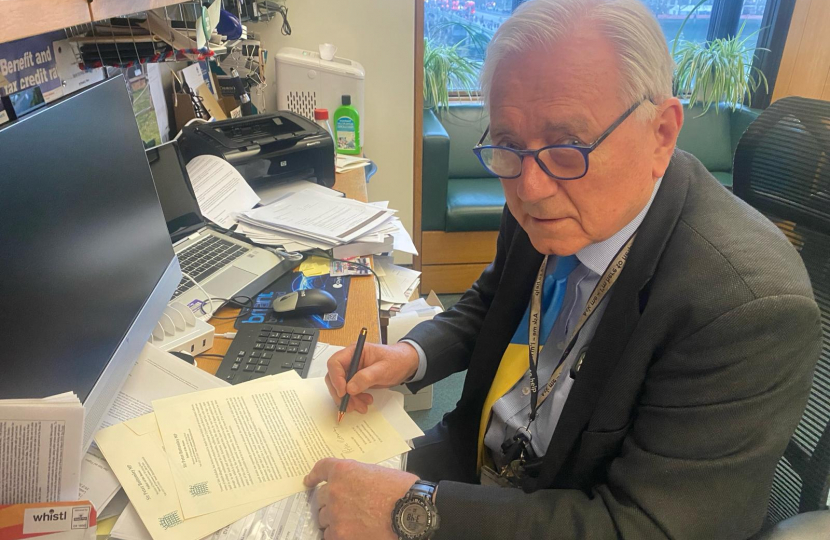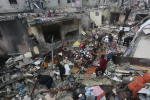
In February, I wrote to the Foreign Secretary asking what work is being undertaken to reach a cessation of hostilities, the steps the UK is taking to bring accountability to any violations of international humanitarian law, and the means by which the UK is scaling up the delivery of aid to civilians of all ages and in all corners of Gaza.
I shared three petitions with the Foreign Secretary each expressing a shared desire for peace, each with varying calls for Government action relating to the release of all hostages, the increased provision of humanitarian aid and a cessation in hostilities as swiftly as possible.
Constituents rightly share in grave concern for the ongoing humanitarian crisis in Gaza and Israel.
We understand and acknowledge the hard work of the Foreign Secretary and dedicated diplomatic teams, including trusted allies and partners across the world, each in support of a peaceful resolution in the region.
I asked for an understanding of the following three ambitions:
- What work is being undertaken to reach a cessation of hostilities and to ensure the safe delivery of humanitarian aid to civilians in Gaza.
- How is the UK promoting respect for international humanitarian law and to bring accountability for any violations that have taken place in the conflict.
- In what way the UK is scaling up the delivery of aid to civilians caught up in the conflict and ensure it reaches all corners of Gaza.
We recognise that not all work that goes on is readily visible to the public. We can appreciate that to do so may diminish the effect of negotiations and planning.
Constituents are justified in desiring a fair understanding of the involvement of the Government and at least an overview of the immense work going on behind the scenes to assist in bringing about an end, as soon as possible, to this suffering and bloodshed.
Lord Ahmad of Wimbledon, Minister of State for the Middle East, North Africa, South Asia, Commonwealth and United Nations and the Prime Minister's Special Representative on Preventing Sexual Violence in Conflict, issued a response on the Foreign Secretary's behalf. The full text is available below.
We recognise that the onus is on Hamas to return Israeli and international hostages and on Israel to cease their ground offensive.
We agree that there must be a cessation in the fighting for the hostages to come out and aid to go in. That should happen straight away.
I will go on supporting the Foreign Secretary in promoting a peaceful resolution to the offensive, ending the misery and bloodshed of so many, and establishing a firm two-state solution to what has been a longstanding and unnecessary conflict.
More can be done. More should be done.
Dear Sir Peter,
Thank you for your letter of 14 February to the Foreign Secretary on behalf of your constituents, about the situation Israel and the Occupied Palestinian Territories. I am replying as the Minister of State for the Middle East.
No-one wants to see this conflict continue. This means achieving a sustainable ceasefire - one that will last and prevent another generation of children living under the constant threat of war - with Hamas no longer in power in Gaza, able to threaten Israel with rocket attacks and other forms of terrorism. A ceasefire will not last if hostages are still being held. Ahead of a permanent ceasefire, we want to see immediate and sustained agreements to be reached. This will allow for hostages to leave and vitally more medical and humanitarian aid to enter Gaza – helping to create the conditions for a durable peace.
There is a desperate need for increased humanitarian support to Gaza. Our focus must be on practical solutions that save lives and end this conflict.
The UK trebled our aid commitment this financial year and is doing everything it can to get more aid in and open more crossings. The current levels are woefully inadequate. Israel must take immediate steps, working with other partners including the UN and Egypt, to significantly increase the flow of unhindered aid into Gaza including allowing prolonged humanitarian pauses, opening more routes into Gaza, and restoring and sustaining water, fuel, and electricity. We have supported the United Nations World Food Programme to deliver a new humanitarian land corridor from Jordan into Gaza, with 750 metric tons of life-saving food aid arriving in the first delivery.
Israel has endured the worst terrorist attack in its history at the hands of Hamas. International Humanitarian Law (IHL) must be respected, and civilians protected. Israel must act within IHL. We keep under continuous review whether they are abiding by their obligations.
On 26 January the International Court of Justice (ICJ) delivered its decision on the provisional measures requested by South Africa in their case against Israel regarding alleged violations of the 1948 Genocide Convention. We respect the role and independence of the ICJ and ask Israel to comply with the decision of the court. As we have made clear, Israel has the right to defend itself against Hamas, whilst adhering to International Humanitarian Law. We welcome the Court’s call for the immediate release of hostages, to get more aid into Gaza, and reminder that all parties to the conflict are bound by International Humanitarian Law.
For a peaceful solution, four things must happen. There must be: a Palestinian-led government in Gaza and the West Bank; a concrete plan to help reform and support the Palestinian Authority; a massive reconstruction plan for Gaza; and the political horizon towards delivering a two-state solution for Israel and Palestine.
Yours sincerely,
LORD (TARIQ) AHMAD OF WIMBLEDON




